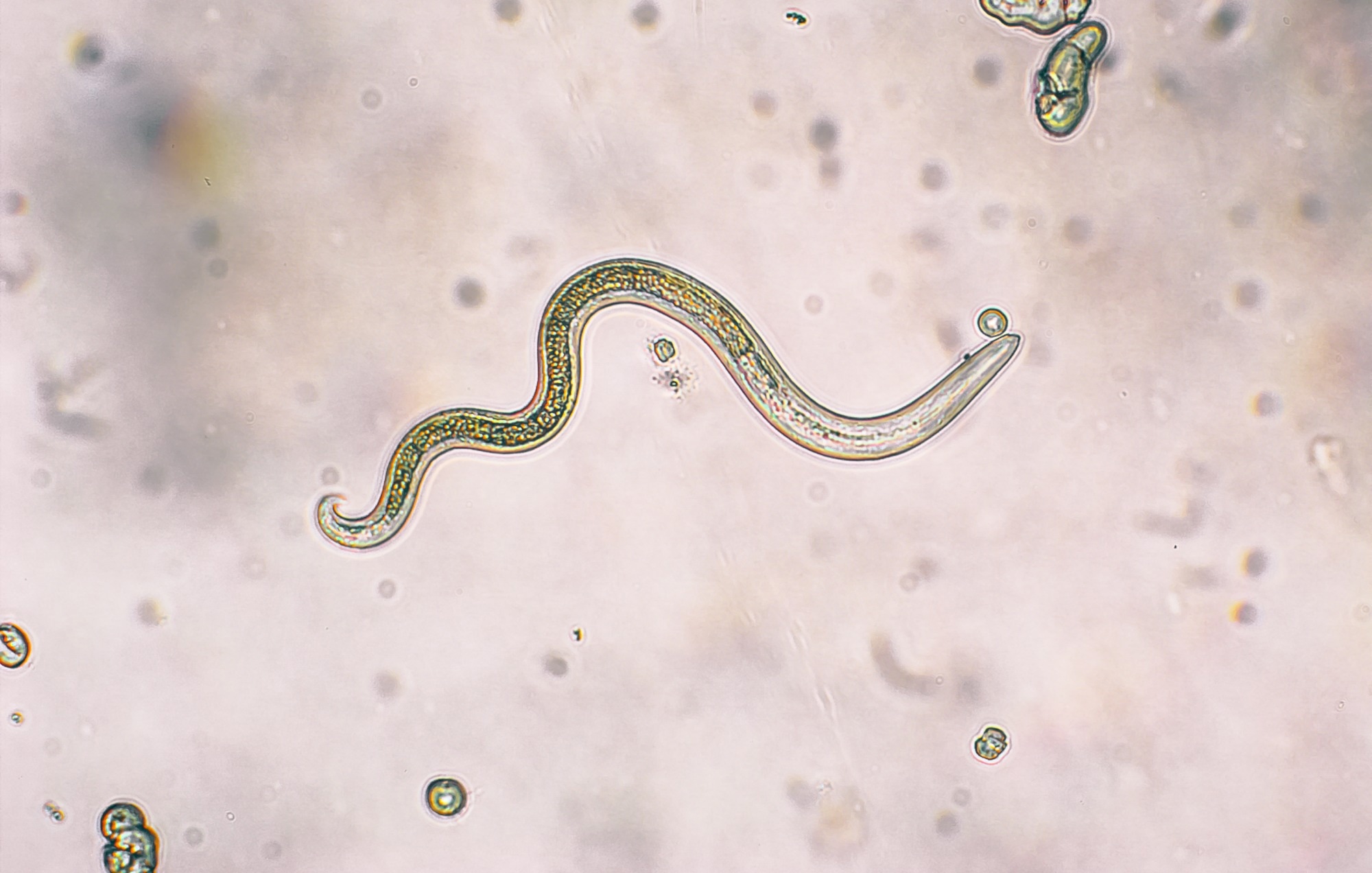Helminths infect more than 25% of the global population. Hookworms, whipworms, and roundworms are responsible for most human helminth infections. Healthy individuals usually present asymptomatic helminth infection, with adult worms persisting in the gastrointestinal (GI) tract for years.
However, in immunocompromised individuals and children, infection in the GI tract could result in substantial morbidity. Helminth infections have a negative impact on immune responses to tuberculosis, hepatitis B, influenza, and measles vaccines. Nevertheless, the effect of infection on SARS-CoV-2 vaccine efficacy remains unknown.
 Study: Intestinal helminth infection impairs vaccine-induced T cell responses and protection against SARS-CoV-2. Image Credit: olgaru79 / Shutterstock
Study: Intestinal helminth infection impairs vaccine-induced T cell responses and protection against SARS-CoV-2. Image Credit: olgaru79 / Shutterstock

 *Important notice: bioRxiv publishes preliminary scientific reports that are not peer-reviewed and, therefore, should not be regarded as conclusive, guide clinical practice/health-related behavior, or treated as established information.
*Important notice: bioRxiv publishes preliminary scientific reports that are not peer-reviewed and, therefore, should not be regarded as conclusive, guide clinical practice/health-related behavior, or treated as established information.
The study and findings
In the present study, researchers evaluated the impact of enteric helminth infection on coronavirus disease 2019 (COVID-19) vaccine efficacy in mice. C57BL/6J mice were primed with an mRNA encoding the SARS-CoV-2 Wuhan-1 spike; animals were boosted three weeks later. Heligmosomoides polygyrus bakeri (Hpb) was inoculated twice, 12 days pre-prime and 12 days pre-boost (P/B).
Two additional groups were infected with Hpb, pre-prime (P) or pre-boost (B). Enzyme-linked immunosorbent assay (ELISA) revealed that non-infected, vaccinated animals elicited immunoglobulin G (IgG) antibodies specific to the viral spike and its receptor-binding domain (RBD) by day 15 post-first dose, which was enhanced by day 15 post-second dose.
Infected groups (P, B, and P/B) also had similar antibody responses; however, animals in the B group had significantly reduced IgG to spike and RBD, and those in the P/B group had reduced response to RBD compared to non-infected vaccinated mice. Further, there were no differences in spike-specific B-cell responses in infected and non-infected animals.
Regardless of infection status, all vaccinated animals induced comparable neutralizing antibody (nAb) titers against SARS-CoV-2 WA1/2020 D614G. Nevertheless, serum from all vaccinated groups had no or little inhibitory activity against Omicron BA.1 or BA.5. Besides, spike-specific clusters of differentiation 8-positive (CD8+) T cells were detectable in the spleen at day 15 post-boost.
Interferon (IFN)γ+ and tumor necrosis factor (TNF)α+ CD8+ T cell responses were marked reduced in Hpb-infected vaccinated mice. These animals also had reduced numbers of IFNγ+ TNFα-, IFN+ interleukin 2 (IL-2+), and IFNγ+ TNFα+ CD8+ T cells, suggesting that Hpb infection suppressed CD8+ T cell effector responses. Infection also suppressed IFNγ+ TNFα+ CD4+ T cell responses.
Further, helminth infection skewed towards T-helper 2 (Th2) differentiation, and this response was unaffected by vaccination. Next, the team examined responses to Janssen’s adenoviral-vectored Ad26.COV2.S vaccine. Mice received the vaccine 12 and 30 days after Hpb infection. The number of spike-specific CD8+ T cells declined two-fold 10 days post-boost.
Further, the numbers and percentages of IFNγ+ TNFα+, IFNγ+ IL-2+, and IFNγ+ TNFα− CD8+ T cells were reduced in Hpb-infected vaccinated mice compared to non-infected vaccinated animals. Infection also depleted IFNγ+ TNFα+ CD4+ T cells in vaccinated mice. Overall, Hpb infection impaired Ad26.COV2.S-induced CD4+ and CD8+ responses but to a lesser extent than with mRNA vaccination.
Further, K18-hACE2 mice were infected with Hpb and subsequently immunized with two mRNA vaccine doses. Naïve mice and Hpb-infected non-vaccinated mice were controls. Animals were challenged with WA1/2020 D614G or Omicron BA.5.5 four to five weeks after the second vaccine dose. D614G infection of control animals reduced their body weight four to five days post-infection. However, regardless of infection, all vaccinated mice were protected from weight loss.
Hpb-infected vaccinated mice showed decreased viral burdens, suggesting that Hpb infection had not affected protection against D614G. By contrast, all vaccinated groups had poor nAb titers against BA.5.5. Hpb-infected vaccinated animals lost about 15% of the weight. Furthermore, Hpb-infected vaccinated mice demonstrated increased viral RNA and infectious virus in the lungs compared to non-infected, vaccinated mice.
Additional experiments suggested that Hpb infection resulted in defective vaccine-induced CD8+ T cell responses. Next, the researchers evaluated whether signal transducer and activator of transcription 6 (STAT6) signaling mediated Hpb-triggered defective CD8+ T cell responses. To this end, vaccination and helminth infection were repeated in congenic wild-type and Stat6-/- mice. mRNA vaccination elicited equivalent CD8+ T cell responses in non-infected WT and Stat6-/-.
Effector cytokine response and CD8+ T cell responses were diminished similarly in infected WT and Stat6-/- mice. This indicated that helminth-associated suppression of CD8+ T cell response to mRNA vaccine was independent of STAT6 signaling. As such, the researchers explored alternative mechanisms and found that helminth-induced IL-10 was the likely suppressor, as IL-10 blockade in Hpb-infected animals restored the vaccine-elicited T-cell response.
Conclusions
In sum, the study evaluated the impact of helminth infection on COVID-19 vaccine responses. The findings suggest that helminth infection did not substantively impact vaccine-elicited antibodies; however, infection affected T-cell responses. This defective T-cell response was irrespective of whether mice were infected before the first or the second dose.
Additionally, Hpb infection compromised protection against Omicron BA.5.5 without substantively impairing protection against the D614G strain. Taken together, the findings illustrate the detrimental effect of intestinal helminth infection on vaccine-induced T-cell responses, and impairment was likely through an IL-10-dependent pathway. Therefore, helminths should be deemed vital factors that could modulate COVID-19 vaccine efficacy and immunogenicity.

 *Important notice: bioRxiv publishes preliminary scientific reports that are not peer-reviewed and, therefore, should not be regarded as conclusive, guide clinical practice/health-related behavior, or treated as established information.
*Important notice: bioRxiv publishes preliminary scientific reports that are not peer-reviewed and, therefore, should not be regarded as conclusive, guide clinical practice/health-related behavior, or treated as established information.